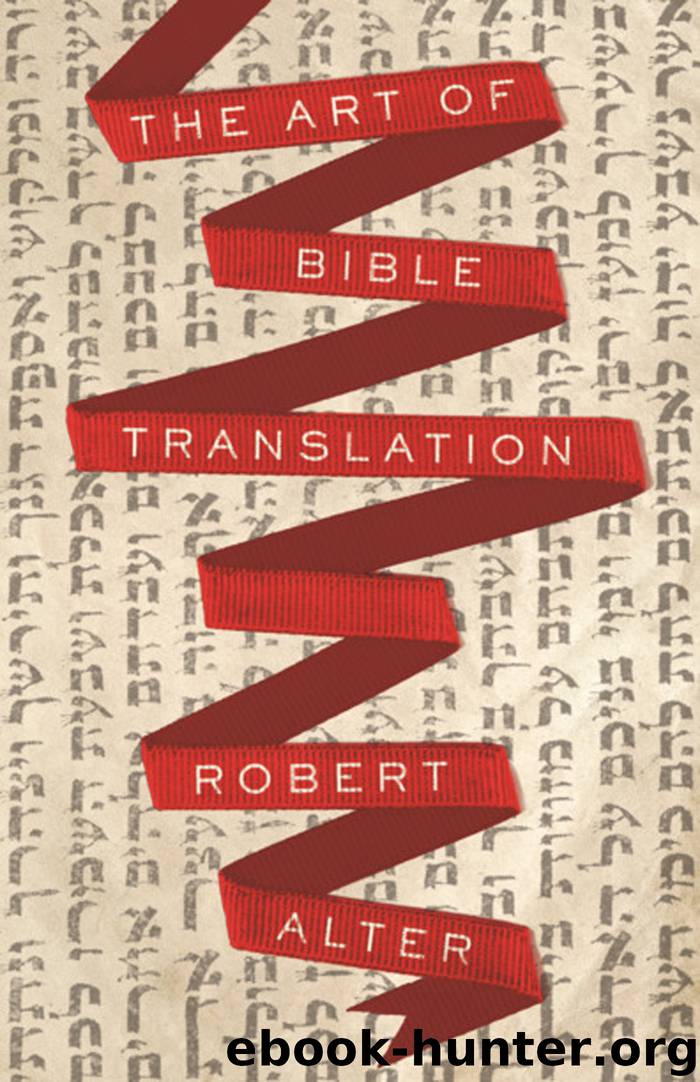The Art of Bible Translation by Robert Alter;

Author:Robert Alter; [Alter;, Robert]
Language: eng
Format: epub
ISBN: 9780691181493
Publisher: Princeton University Press
Published: 2019-01-15T07:00:00+00:00
CHAPTER FOUR
Sound Play and Word Play
SOUND PLAY AND WORD PLAY are ubiquitous in literature, and they are an abounding presence in the Hebrew Bible, both in the poetry and in the prose. The limit case of such play with language is the pun, which is often essential to the meaning and just as often an insuperable challenge to the translator. Let me offer an illustration from English poetry that will be transparent to anyone who knows the language. John Donne, one of the great poets of the seventeenth century, who early in his career wrote some of the most splendidly sensual love poems in the English tradition, became an Anglican divine and an intensely religious poet, composing, among other spiritual texts, several penitential poems as he apprehended that his end was near. One of these, “A Hymn to God the Father” (despite the title, it is really a confession) comprises three rhyming stanzas, the first two of which conclude with the following lines, “When Thou hast done, Thou hast not done, / For, I have more.” The repeated “done” clearly puns on his own last name. Any conceivable translator, unless willing to contort or distort the lines in order to somehow approximate the pun, would have to give it up, but much of the urgent point would be given up as well: God may seem to have done, but He must listen to another two stanzas of confession, so He neither has done nor yet has Donne. The concluding stanza enjoins God to pledge that at the moment of the poet’s death His son—another pun referring both to “sun” and Christ—will shine, “And, having done that, Thou hast done, / I fear no more.” Serious puns of this order of meaningful brilliance are the translator’s despair, and there are many of them in the Bible.
Sound play and word play at least sometimes lend themselves to viable English equivalents, but puns rarely do. The translator may be able to find a partial, perhaps slightly awkward solution, though in many instances he or she may have to give it up, as the example from “A Hymn to God the Father” may suggest. It should be said that, with very rare exceptions, translators of the Bible have not even tried to work out solutions to this challenge. The same translators, after all, who ride roughshod over the Hebrew syntax and are obtuse about the word choices of the Hebrew writers would scarcely think that the play of sound of the Hebrew words or the way they inscribe double meanings was part of the translator’s task.
Here are just a few instances of puns in which there is nothing much a translator can do. In 1 Samuel 25, when Abigail rushes out to head off David’s band of men bent on vengeance against her obnoxious husband, she begins her shrewd speech to David with the following words, “Mine, my lord, is the blame!” (verse 24). But the first monosyllabic word in the Hebrew, bi, has
Download
This site does not store any files on its server. We only index and link to content provided by other sites. Please contact the content providers to delete copyright contents if any and email us, we'll remove relevant links or contents immediately.
| Exegesis & Hermeneutics | New Testament |
| Old Testament |
The Five People You Meet in Heaven by Mitch Albom(3336)
Real Sex by Lauren F. Winner(2867)
Name Book, The: Over 10,000 Names--Their Meanings, Origins, and Spiritual Significance by Astoria Dorothy(2840)
The Holy Spirit by Billy Graham(2777)
The Secret Power of Speaking God's Word by Joyce Meyer(2754)
ESV Study Bible by Crossway(2671)
How The Mind Works by Steven Pinker(2612)
0041152001443424520 .pdf by Unknown(2599)
Ancient Worlds by Michael Scott(2496)
The ESV Study Bible by Crossway Bibles(2420)
The Gnostic Gospels by Pagels Elaine(2399)
The Meaning of the Library by unknow(2386)
Churchill by Paul Johnson(2368)
MOSES THE EGYPTIAN by Jan Assmann(2276)
City of Stairs by Robert Jackson Bennett(2233)
Jesus by Paul Johnson(2229)
The Complete Dead Sea Scrolls in English (7th Edition) (Penguin Classics) by Geza Vermes(2136)
Ancient Near Eastern Thought and the Old Testament by John H. Walton(2131)
The Nativity by Geza Vermes(2115)
